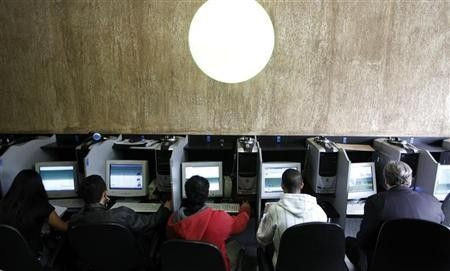Nigerian Citizens Call For Transparency Amid Suspicions Of Shady Government Deal For Internet Surveillance

Public outcry over suspicions of a new Internet monitoring plan is growing in the West African nation of Nigeria, and government officials are keeping eerily quiet. But some concerned citizens have been working to break the silence -- and now the issue is about to get its day in court.
The controversy began in April when the Premium Times, a newspaper based in the capital city of Abuja, reported on a secret deal between the Nigerian government and the Israeli defense electronics firm Elbit Systems Ltd. (TLV:ESLT).
An Elbit press release noted in April that an unnamed “country in Africa” had agreed to a $40 million deal to secure a sophisticated cyberdefense tool called the Wise Intelligence Technology, or WiT, system for intelligence analysis and cyberdefense. It did not mention Nigeria, but anonymous officials told the Premium Times that the administration of President Goodluck Jonathan was indeed a party to the deal.
Critics of the government argue that the system would enable the Nigerian government to exercise an inappropriate level of control over Internet communications in the country.
An Elbit representative told the International Business Times that the company was aware of the reports, but refused to either confirm or deny them. The Nigerian government did not respond to requests for comment.
But Nigerian entrepreneur ’Gbenga Sesan found and publicized a document from the country’s Budget Office showing that the government had set aside more than $60 million for three systems: one for Internet monitoring, another for Internet surveillance and a third for something called a “Wise Intelligence Network Harvest Analyzer System.”
Sesan is the executive director of Paradigm Initiative Nigeria, a civil-society group that uses technology to bring about social change. In an attempt to get to the bottom of the alleged Elbit deal, he filed a freedom-of-information, or FoI, request in May. In accordance with a 2011 FoI bill signed by Jonathan, a response should have been delivered within a week.
“The government refused to respond to the FoI request after seven days,” Sesan said. “So we've gone to court.” He filed an order of mandamus on Wednesday: If successful, it would oblige the administration to respond to his request.
Nigeria suffered decades of instability under a series of autocratic military rulers until 1999. Today, the government is democratic. But Nigeria’s military has come under intense international scrutiny, especially in recent months. It is engaged in operations to oust militants belonging to the Islamist group Boko Haram, which is based in northern Nigeria and has killed more than 1,000 people over the past two years. Government troops have been targeting suspected militants with a heavy hand, reportedly terrorizing Muslim communities and killing innocent citizens.
The economic situation hasn’t helped matters: Fiscal mismanagement in the oil-rich country has resulted in an egregious wealth gap. Nigeria’s hydrocarbon revenue has helped the sub-Saharan country achieve a gross domestic product of about $235 billion -- the second-highest in Africa, according to World Bank data -- but more than one-half of the population lives below the poverty line. Cronyism is partly to blame, with 94 percent of citizens saying corruption is widespread, according to a Gallup poll conducted last year.
Public dissent is alive and well in Nigeria, and the Internet remains a relatively free sphere of communication. But some worry that the WiT system could change that.
“The Internet is probably the only space where Nigerian citizens have experienced true freedom, considering the context of Nigeria’s military past and dictatorial tendencies of security agencies,” Sesan said. “It’s also important because the Nigerian government is carrying out all these activities without regard for the rule of law they always talk about.”
The problem is that government regulations to protect users are still inadequate. Nigeria does not have a data-privacy law. One piece of legislation called the Cyber Security Bill has stalled in the drafting stages for years.
By itself, the WiT system is not necessarily illegal. It could help to improve online security and protect citizens from hacking and Internet fraud. The system has wide-ranging capabilities: It can make use of everything from satellite imagery to email monitoring to phone conversations. But it will be the government’s responsibility to employ the technology in a legal and transparent way.
Sesan, whose organization recently released a policy brief on these issues, hopes that the right framework is created before Nigeria implements any wide-ranging Internet surveillance systems. “If Nigeria starts monitoring, no one -- media, active citizens, civil society, and not even [politicians] after leaving office -- will be safe because abuse will happen,” he said.
© Copyright IBTimes 2024. All rights reserved.






















